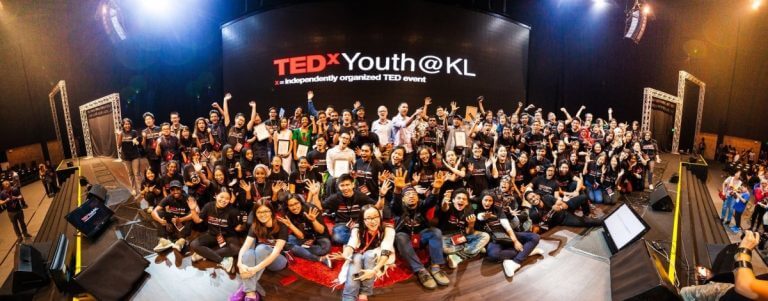
The three scientists who took to the TedxYouth@KL stage one recent weekend in Malaysia made it look easy.
In 15 minutes, they wowed an enthralled audience with their knowledge and passion for science and for some, changed the way they viewed the world.
But how did they become who they are? Where did they study and hone their skills?
Study International sat down with (and emailed) the three to learn a thing about two about them, their work and their message to budding scientists.
Here’s what they had to say:
1. “Develop more math skills” – Aaron Shunk, geologist and founder of PubliSci.com
Who knew paleoclimatology could be this interesting? #TEDxYouthKL #WhatNow2017 #TDS17 pic.twitter.com/H6f86ccMFG
— The Daily Seni (@thedailyseni) February 25, 2017
Shunk initially went to university to become an athlete. But one “eye-opening” paleontology class during undergrad changed his mind as he discovered the beauty of science.
This spark was the beginning of Shunk’s passion in rocks, which he says “all tell an interesting story”. It led him to getting a Master’s in Geology at the University of Tennessee, Knoxville and finally, a PhD in Geology at Baylor University.
Now, Shunk is a geologist at the Shell Oil company and the co-founder of PubliSci.com, a non-profit crowdfunding website aimed at making science more accessible to all through an online forum where anyone with an Internet connection can share their studies.
Recalling his first calculus and calculus-based physics classes, Shunk, who was not big on academia then, said, “For the first time, I understood what math could do”.
He urged budding scientists to not blow off algebra and geometry like he did back in high school, as it could really help their future careers in science.
“Anything you quantify, adds value/ Anytime you put numbers to something, it makes it more meaningful,” he added.
2. “Try and understand what the work entails. If you do like it, then go full steam ahead” – Professor Cheong Sok Ching, Lead Scientist for the Head and Neck Cancer (HNC) Research Team at Cancer Research Malaysia
Here's more! #TEDxYouthKL #WhatNow2017 pic.twitter.com/jg10jkWfEI
— Puteri N. Balqis (@ayyputeri) February 25, 2017
With a first-class honours Life and Science degree in Biochemistry as well as a PhD degree from the National University of Malaysia, Professor Cheong now leads a team of scientists at a top research institution in Malaysia, specialising in head and neck cancer. She and her team have won many accolades for their contributions to oral cancer research.
But as the adjunct professor at the University of Malaya will tell you, the road to her success today was a long one.
“Sometimes people think that being a scientist is a very glamorous job,” but for her to give a 10 minutes talk at the TedxYouth@KL stage, “it took me 10 years to do the work that made it so”.
She urged students to really understand what the work of a scientist will entail, by taking on practical work such as internships.
“If you do (like it), then really go full steam ahead”.
3. “Do not use the words ‘Darwin’s theory’ – it is no longer just a theory” – Dr John Payne, Sumatran Rhino Conservationist and executive director at Borneo Rhino Alliance
https://twitter.com/nrfrpls/status/835405260969553920
In less than 15 minutes, Dr John Payne’s TedxYouth@KL’s talk drove home the growing crisis of one of the of the world’s most endangered mammal, which many in the audience did not even know was happening in their very own backyard.
Only three Sumatran rhinos are left in Malaysia, and time is running out to get as many baby rhinos born as possible. But there is progress, thanks to Dr Payne, BORA and the development of in vitro techniques in recent decades – soon, we can hope to produce rhino embryos from egg and sperm in a laboratory.
Dr Payne’s journey begin back in 1961, when he was a seven-year-old reading about the foundation of World Wildlife Fund (WWF) in a British newspaper. Since then, he has dedicated his life to wildlife conservation, graduating with a Bachelor of Science, Zoology from King’s College London in 1975 and later, with a PhD in Ecology from the University of Cambridge in 1980.
Since then, he has been a respected public figure in the environmental conservation world. From 1979-81, Dr Payne helped conduct the first statewide survey of wildlife in Sabah and from 1982-98, was the state-level head of WWF Malaysia. He is also the author or co-author of seven books, including A Field Guide to the Mammals of Borneo (1985) and Orang-utans (2008).
To students, Dr Payne had these valuable insights and advice:
“Read these two books: Homo Deus by Yuval Noah Harari, 2016, Harvill Secker, London and Thinking, Fast and Slow by Daniel Kahneman, 2011, Allen Lane. Or, instead of the second one, an easier to read is the plagiarised version, The Art of Thinking Clearly by Rolf Dobelli, 2013, Sceptre.
“In addition, try to read and understand at least some aspects of cell and molecular biology. That is the basis of all life.
“Read and understand the concept of evolution by natural selection and replication. All other interpretations of the reality of life are false. Do not use the words ‘Darwin’s theory’. That came out in 1858. It is no longer just a theory. Millions of people working on millions of topics since then show that evolution by natural selection and replication is what has actually happened at molecular, cellular, organismal and consciousness levels of existence.
“Make your own rational thinking and decisions, realising that whatever you read and hear from others are almost entirely cognitive biases.”
Liked this? Then you’ll love these…
Why Study Sustainability and Environmental Sciences







